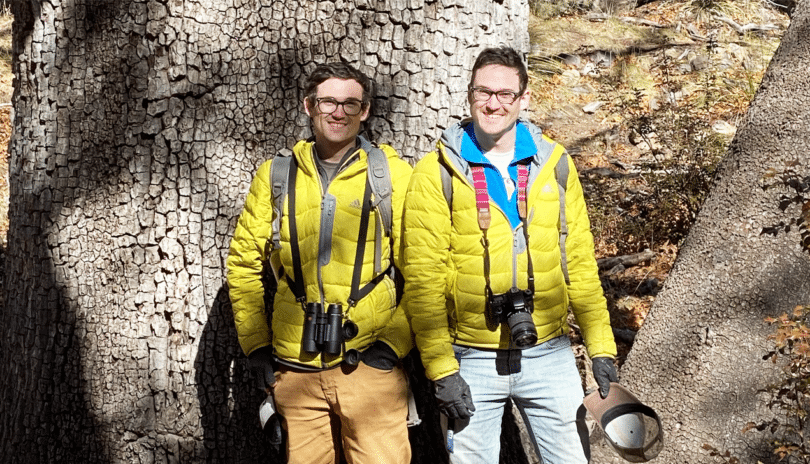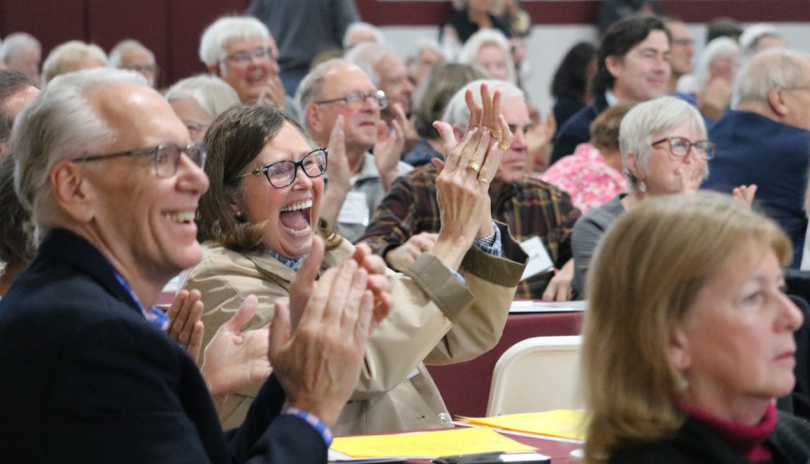While the primary mission of Horizons at DCD is to counter summer learning loss in under-resourced students, DCD alumni who return as instructors and interns may find themselves unexpectedly living the DCD motto of Learning Is a Way of Life, as they gain valuable understanding and foster connection within the DCD community and beyond.
Luke Hotra ’19 is a high school junior; having attended DCD since kindergarten, he’s now returned for the third year in a row to serve as a Horizons volunteer. “It’s not really about my enjoyment, but on top of trying to do a good job and good work with this program, I do really enjoy working with the students,” Luke says. “I really like seeing how they’ve grown up from one summer to the next. Growing up, getting more responsible, going through a lot of the same things I went through in school.” While Luke finds himself frequently connecting with his students over their shared experiences, he also recognizes where these diverge. “The experiences of these kids are a lot different. I think Horizons has given me more understanding and patience, as well as just the ability to understand and connect with different people and their experiences.”
Sophie Hiatt ’18, another DCD alumna, views her work as a volunteer in a similar light. Now a high school senior, Sophie sees her interest in Human Rights Law informed by her work with Horizons. “Working with these kids helps me frame different ways of life, different people,” Sophie says. “It helps me understand different experiences, as opposed to my single perspective. I think it’s important to learn how to look at each child’s individual background, really trying to understand them and meet them where they’re at, to build that trust and those relationships.”
This value for a learned understanding is embodied by many of the Horizons staff, including Sarah Mahoney, who now serves as the academic coordinator for Horizons. Sarah attended DCD as a student, but notes that even then, she felt the need for a diversity of connection. “I was able to attend DCD because my mom worked here,” she says. “But normally we wouldn’t have been able to afford a school like this. So to a certain extent I always felt a little on the outskirts and not always able to relate to the other kids. And I always felt personally that I related a lot more to the students from Horizons.” Sarah explains how, through her work with both DCD Summer Camp and Horizons, she was able to gain specific insight into the lives of both groups — how in some ways they were similar to her own experiences, in others wildly different. “These are things that you don’t always think about if you haven’t been through it,” she says. “Because if you don’t see it everyday, it’s easy to forget that not everyone has the same experience as you.”
Along with its volunteers, teachers, and staff, Horizons leadership is well aware of the positive impact this connection and understanding can have when different groups connect, and it’s something they hope to see more of in the future. “Over the last few years, we’ve seen in our world a huge divide — with social class, with race, with religion,” says Haris Kuljancic, the executive director of Horizons at DCD. “A tremendous divide across the board. Growing up as a kid, you don’t naturally know that divide. You don’t see it. Until you do. And for students of color, and students of lower economic status, grappling with that identity comes a lot sooner.” Haris understands this issue from a personal perspective. “Although I came to this country as a refugee and my family grew up in a lower economic status, I’m still seen as a white male, and I’ve benefited from those privileges in ways that many of my friends growing up didn’t,” he says. “I always felt very close to my peers until I realized how privileged I was. And now I wonder how they felt.”
Thankfully, Haris sees the partnership between DCD and Horizons as a powerful tool in supporting students in their ongoing learning about these challenging divides. “Independent schools are sometimes in danger of becoming bubbles, cut off from the outer community. But during the Horizons six-week summer program, we have an incredibly diverse group of students, volunteers and staff that get to know other people who aren’t just like them.”
When Haris looks at the DCD alumni who have returned to Horizons as volunteers, he sees this as an uncommon demonstration of commitment to intentional and continued learning on both sides. “I think about the DCD volunteers at Horizons, and how they’re now able to bridge that divide a little bit, and realize the value in education and the opportunities available to students, and how they can do their part to make that opportunity more available,” he explains. “And for Horizons students who may not usually feel welcome in spaces that are predominantly white, they’re able to see that in these spaces they are welcome, that they’ll be treated well, and that feeling comfortable is achievable. And I would hope that in their lives, this is something that will become the norm for them. When they interact with places that are often considered off-limits for them, they can feel that same warmth and that belonging that they feel at Horizons and DCD.”
Haris sees a wide range of value offered by Horizons, including academic support and social skills. But when asked to consider the program’s greatest impact, he can’t overlook this opportunity for learning to build empathy. “Learning how to coexist in the most positive way with one another and treat each other with kindness, respect, fairness, and equity,” he says. “That’s something you can’t teach. That happens only through interaction.”
Horizons and DCD have accomplished a great deal in their 13 years together. Toward the future lies the hope to do even more. And in doing so, Horizons and DCD will continue to offer one another an unparalleled opportunity to live the DCD motto of Learning Is a Way of Life through connection and understanding.
Learn more about DCD and Horizons and visit the Horizons website!







